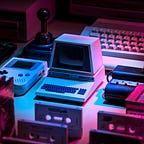Towards Preserving Digital Culture: An interview with Jakob Moesgaard
Towards Preserving Digital Culture series is a contribution to the Software Heritage initiative supported by INRIA and UNESCO. The primary objective of this series is to underscore the pivotal role of software heritage preservation in mitigating the loss of digital cultural heritage. Through these interviews, we present diverse perspectives to foster discussions on challenges related to technological progress, obsolescence, legal limitations, and preservation complexities, contributing to addressing current field needs.
Hello Jakob! Thanks for joining us! First, could you tell us more about yourself?
Yes, sure! I graduated with a degree in Indian Studies and History of Religion, & I now work at the Royal Danish Library. My job is to preserve our common digital cultural heritage. My primary field is videogames preservation, but I also work with software preservation in general and with web archiving.
What are the main benefits of software preservation?
A relevant question — why even bother? It boils down to recognising that an enormous part of contemporary discourse in every single field of life has a digital component. For better or for worse. And if we don’t attempt to preserve it, this will almost certainly be lost for posterity.
We need to be able to access these creations later. We can not understand the present ourselves if we can not examine our past! Imagine if we had no paintings, or literary works from the 19th century because they all got lost somehow. No administrative records of human actions, lawmaking, thinking, etc. It would be impossible to trace the cultural, political, and economic paths that have led us to where we are now.
Over the past 25 years, we’ve learned that many of these activities are either purely digital now or have significant digital components. At least in my “Western” part of the world, I think that we might have dodged the worst “digital dark ages”- scenario, but we need even more diligence now. There are huge, entire fields of human creativity and endeavor that are completely digital. If we fail to take action, we leave the survival activities attached to software to lucky circumstances, as we have seen in the past.
Software is in itself as valuable as other cultural artifacts and as artistic works such as games. Moreover, software is also needed for us to understand obsolete file formats for instance. Both the practice itself (working with software preservation, creating and using the tools and methods of the field), and the result of that practice (ie. the Archives) have inherent value, I think. At least if we take a conscious approach to force ourselves to decide, as best we can, what to keep and how to provide access to future researchers. In many ways, we are trying to ensure sustainability here.
What are the challenges and/or obstacles?
The sheer amount of digital material is the main obstacle, I think. We have long surpassed the point where we can hope to preserve and document more than the tiniest fraction. Naturally, Cultural Heritage Institutions should attempt to select & preserve the most important collections first. However, it inevitably leads to another inherent challenge in any archival practice: selection bias. Particularly because it easily leads to cultural blindness, mainstream chauvinism, or whatever you want to call it.
We need everybody to take an active approach in this regard. We cannot blindly hope that the cultural mainstream will help us out. We have an obligation to create as many facets of a picture of our present as possible, particularly regarding saving/archiving minority life expressions and the multitude of discourses that run parallel to the Western mainstream.
What would be your advice on collectively moving forward on software preservation?
Working together and spreading awareness of preserving our Digital Culture. We need cooperations between institutions and — equally important — between artists, researchers, creators, platform owners, and lawmakers. Heritage institutions and large corporations will not be able to handle the task on their own! Together, we have a chance of minimizing the losses.
Could you recommend us with a blog, article or publication that you particularly appreciated?
I really like Trevor Owens’ book from 2018 called The Theory and Craft of Digital Preservation. It is an excellent all-round introduction to the subject!
Additionally, I would absolutely recommend anyone to read Replayed — a brand new collection of the writings of Henry Lowood, who has long been a hero of mine in the field of videogame preservation.
As for my thoughts on digital (videogame) culture and the praxis of trying to preserve that (whatever that is), I am definitely inspired by the brilliant Miguel Sicart (and funny, too!).
Thank you, Jakob, for participating in this interview series!
